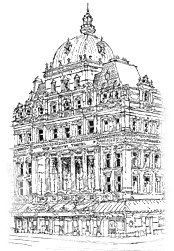
 | The Gallini Family Tree |
| Home | Contact | Statistics | Index |
Hanover Square Rooms, London
 |
Hanover Square Rooms. Formerly London's principle venue for concerts, built by Sir John Gallini, in partnership with J. C. Bach and K. F. Abel and opened in 1775 with a Bach–Abel subscription concert. Francesco Albertarelli and Madam Sisley sung a duet at the first concert arranged by Gallini on 6th February 1972 under the direction of Federici. Morelli performed a number of oratories regularly at the Hanover Square Rooms from February to the end of March 1792. In 1791–2 and 1794–5, Haydn's 12 Salomon symphonies. were introduced. A letter was written to Mozart to confirm a contract signed on 8th December 1790 to compose a new opera and for it to performed at the Hanover Square Rooms and Gallini deposited 3000 Gulden in a Vienna Bank account in advance. A suite of rooms in the West End of London, at the north-west corner of Hanover Square. It included a lofty room, about 27 by 9 metres, with high windows and an arched ceiling, and seating up to 900, which became the premier concert room in London. It had excellent acoustics but was sometimes criticized for its poor amenities and illumination. Gallini's double contract with the Kings Theatre with the profits that ensued enabled him to take chances by introducing new repertoire and moving away from Golonian domestic farce to more daring works. Originally owned by Sir John Gallini , initially in partnership with J. C. Bach and C. F. Abel , the Hanover Square Rooms opened in 1775 and housed the Bach–Abel concerts until Bach's death in 1782 . The Professional Concerts were given there, 1783 – 93 , and from 1786 the Salomon series at which Haydn appeared in the early 1790s. Other notable series include the Concert of Ancient Music, 1804 – 48 , and the Philharmonic Society concerts, 1833 – 69 . Among the artists to appear at the Hanover Square Rooms were Mendelssohn , Paganini , Liszt , Clara Schumann , Jenny Lind , Anton Rubinstein , and Joachim . The Philharmonic Society concerts were given there 1833–69. The last concert there was given in 1874 by the Royal Academy of Music, which had used the rooms since 1823 . The premises were sold the following year and converted into a club. |